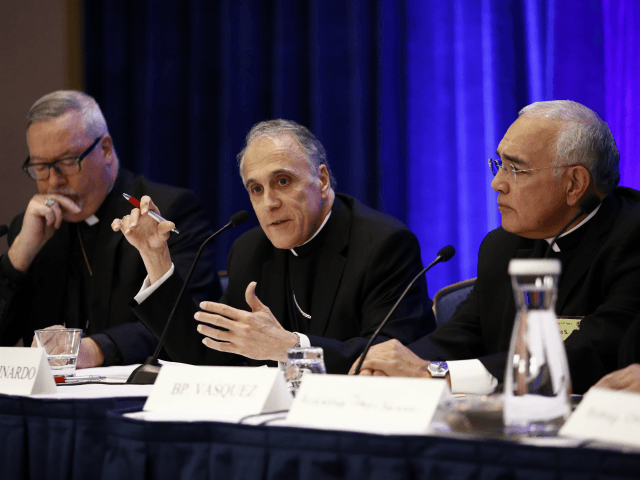The president of the U.S. Bishops Conference (USCCB) has written a letter to every U.S. senator urging them not to make support for Roe v. Wade into a “litmus test” for judicial nominees.
In his open letter sent to members of the Senate Friday, Cardinal Daniel N. DiNardo reminds politicians that “a nominees’ faith should not be used as a proxy for their views on Roe. Any religious test for public office is both unjust and unconstitutional.”
The letter has been timed to coincide with President Trump’s appointment of a new Supreme Court justice to replace Anthony Kennedy, who announced his retirement last month. Commentary on the upcoming appointment has overwhelmingly centered on the notorious Roe v. Wade decision of 1973, which legalized abortion throughout the country.
Cardinal DiNardo’s comments recall last year’s targeted grilling of judicial nominee—now judge—Amy Coney Barrett, which raised the specter of a “religious test” being used to winnow out people of serious faith as unqualified to hold public office, which is expressly forbidden by Article VI of the U.S. Constitution.
At that time, several Democratic Senators —notably Dianne Feinstein (D., Calif.), Dick Durbin (D., Ill.) and Mazie Hirono (D-Hawaii)— homed on Barrett’s Catholic faith by, suggesting that firm adherence to a religious creed is incompatible with unbiased adjudication.
“When you read your speeches, the conclusion one draws is that the dogma lives loudly within you,” Feinstein said. “And that’s of concern when you come to big issues that large numbers of people have fought for for years in this country.”
For his part, Senator Durbin criticized Barrett’s prior use of the term “orthodox Catholic,” saying it unfairly maligns Catholics who do not hold certain positions about abortion or the death penalty. “Do you consider yourself an orthodox Catholic?” he asked her, before asking her what she thought of Pope Francis.
Soon after the hazing, the U.S. Bishops denounced the faith-based harassment of Barrett as “anti-Catholic bigotry.”
In a statement, Archbishop William E. Lori of Baltimore, Chairman of the USCCB Ad Hoc Committee on Religious Liberty, forcefully criticized the line of questioning directed at Barrett during the hearing.
The senators’ questions “harken back to a time in our country when anti-Catholic bigotry did distort our laws and civil order,” Lori wrote, and are “a reminder that we must remain vigilant against latent bigotries that may still infect our national soul.”
The archbishop also wondered aloud whether the Senators in question meant for their harassment of Prof. Barrett to cow aspiring future justices into keeping their faith to themselves.
“Were the comments of the Senators meant as a warning shot to future law students and attorneys, that they should never discuss their faith in a public forum, if they have aspirations to serve in the federal judiciary?” he asked. “In truth, we should be encouraging faithful, ethical attorneys to serve in public office, not discouraging them by subjecting them to inappropriate, unnecessary interrogation based on their religious beliefs.”
In last Friday’s letter, Cardinal DiNardo voiced the bishops’ “grave concerns about the confirmation process, which is being grossly distorted by efforts to subject judicial nominees to a litmus test in support of Roe, as though nominees who oppose the purposeful taking of innocent human life are somehow unfit for judicial office in the United States.”
Referencing the intense criticism of the Roe decision for its judicial overreach, DiNardo said that by any measure, “support for Roe is an impoverished standard for assessing judicial ability. For forty-five years, Roe has sparked more informed criticism and public resistance than any other court decision of the late 20th century.”
“If a Supreme Court ruling was wrongly decided, is widely rejected as morally flawed and socially harmful, and is seen even by many supporters as having little basis in the Constitution, these are very good reasons not to use it as a litmus test for future judges,” the cardinal wrote.
Many have drawn parallels between Roe v. Wade and the infamous 1857 Dred Scott Supreme Court case, which ruled that no black person could be an American citizen and therefore had no standing to sue in federal court.
If a servile obeisance to legal “precedent” had prevented justices, citizens, and lawmakers from reviewing the merits of that decision, it would still be the law of the land today.
In his famous 1858 “House Divided” speech at Springfield, Illinois, President Abraham Lincoln warned where this sort of judicial overreach could lead, when justices usurp powers that are not theirs and thereby undermine the democratic process.
“We shall lie down pleasantly dreaming that the people of Missouri are on the verge of making their State free, and we shall awake to the reality instead, that the Supreme Court has made Illinois a slave State,” Lincoln said.
Follow Thomas D. Williams on Twitter Follow @tdwilliamsrome

COMMENTS
Please let us know if you're having issues with commenting.